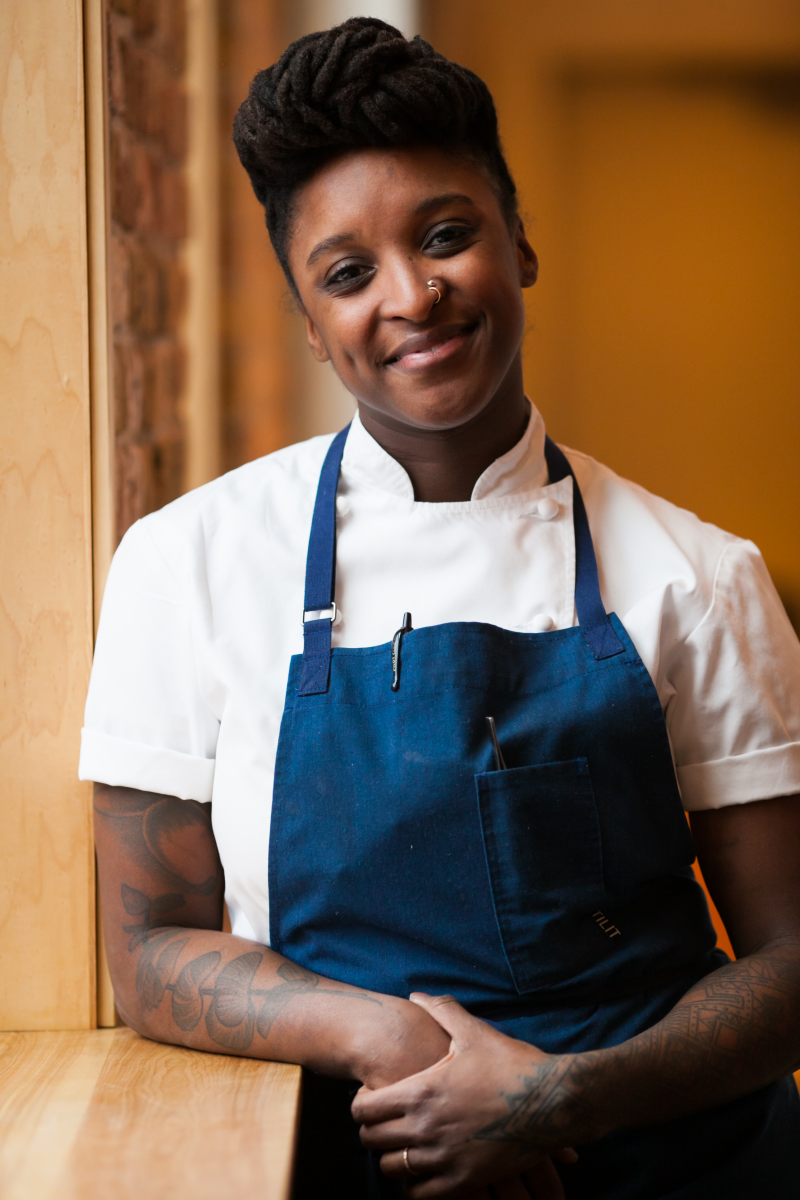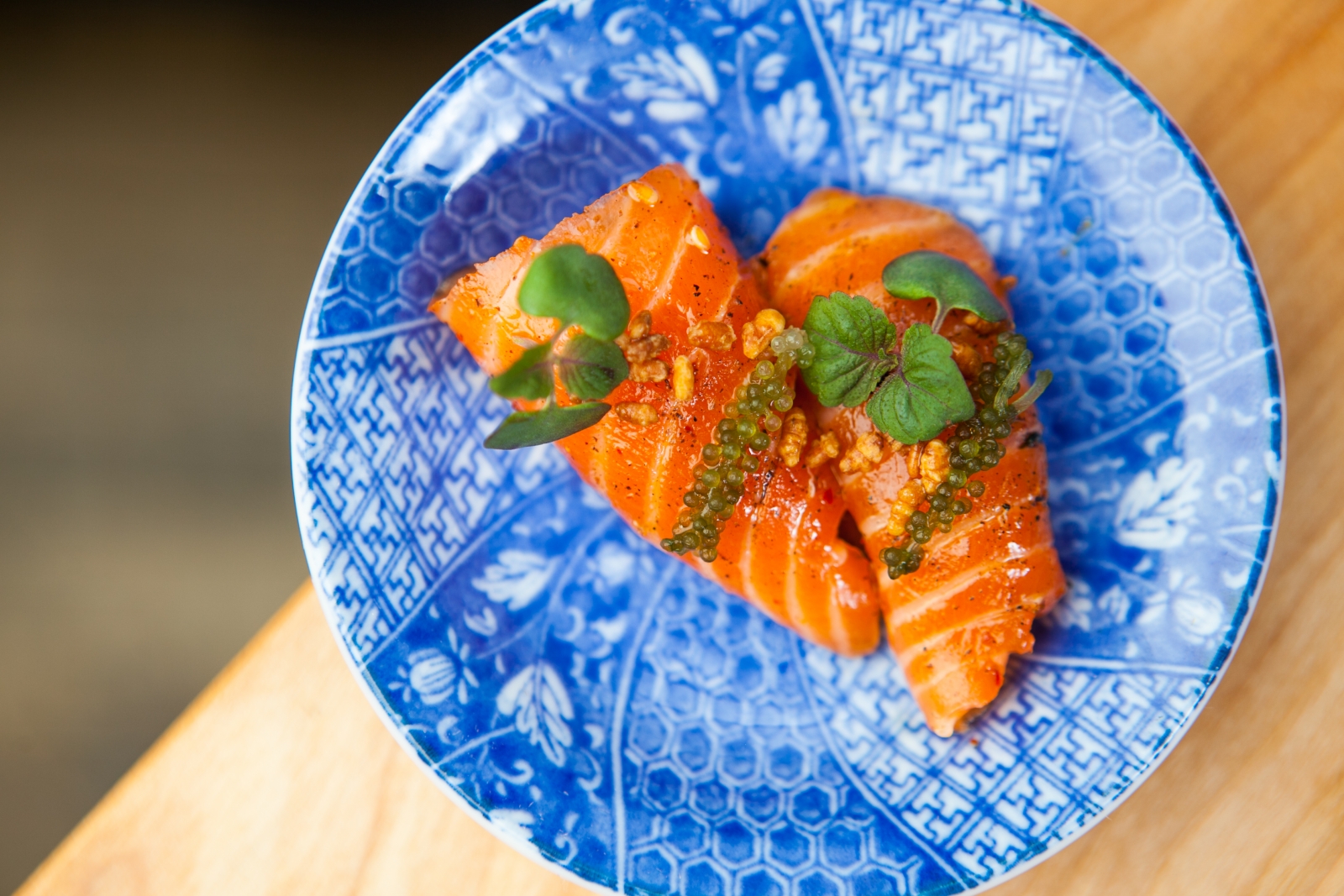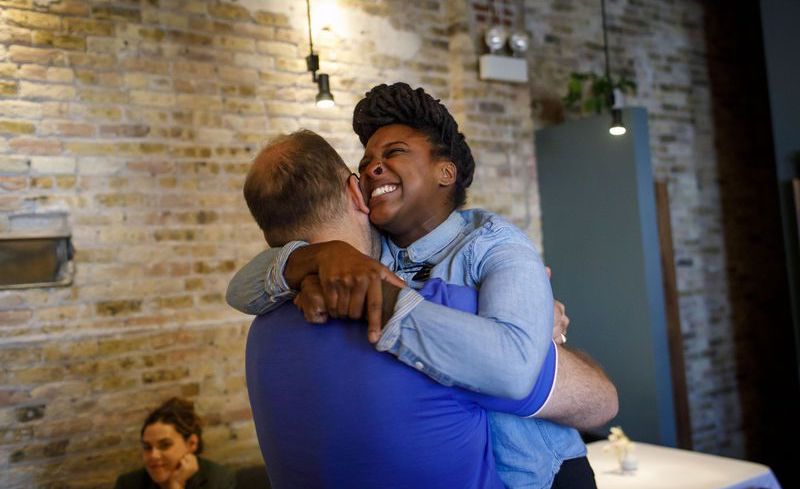
Each week at Kikkō, the Michelin-starred omakase restaurant located underneath sister bar Kumiko, chef de cuisine Mariya Russell greets the hundred-odd diners with a subtle variation on the same speech. She presents and describes the first bite, encouraging diners to ask questions and interact as much or as little as they like. She always ends with a subtle reminder: “We’re very much human behind the bar, and we want you to have a great time.”
It’s Russell’s way of welcoming people into her home at Kikkō, which, along with Kumiko, is the sophomore project from Oriole’s Noah and Cara Sandoval and creative director Julia Momose. There, for the next two hours, Russell and her small team prepare and serve seven Japanese-inspired dishes — like ora king salmon sashimi topped with puffed skin and house-made togarashi — to eight diners at a time. These pristine dishes have earned her a place in the spotlight: In September, she became the first black woman in the 93-year history of the Michelin Guide to earn a star.
“It has been a little overwhelming, like, ‘OK, everybody is definitely watching me now.’ Anybody that has a Michelin attached to their restaurant feels pressure, but then sometimes I feel like the fact that’s it’s then attached to ‘You’re the first black woman to get a Michelin star’ makes it a spectacle,” Russell says. “But it’s also very cool that people can come see me and we can hang out together for two hours.”
She’s no stranger to pressure, having worked with Sandoval at critically acclaimed spots Oriole and Senza, as well as at the Bristol and bygone Bib Gourmand vegetable restaurant Green Zebra. But with Kumiko’s face-to-face omakase format, this is the first time she’s directly answerable to scrutiny. Nor was the historical weight of this moment lost on her: She and husband Garrett Russell, Kumiko’s sous chef, already researched whether any of the numerous female Michelin-starred chefs of the past century were black. (Spoiler: not one.) The first black man to earn a Michelin star was French chef Louis-Philippe Vigilant, who made history in 2014 at Loiseau des Ducs restaurant in Dijon, France.
Basically, Garrett Googled every previous woman Michelin star winner to see what they looked like, and that took a while,” Russell deadpans.
Yet, she takes up this new mantle with calm resolve, the human embodiment of a phrase she often repeated during our conversation: “Let’s do this.”

Russell grew up in Springfield, Ohio, about 45 minutes outside Columbus. She took an early interest in food, learning to cook eggs, Easy Mac, and frozen pizzas for the neighborhood kids who flocked over to swim in their inflatable pool each summer. She loved the Food Network and would mimic the little glass prep bowls with a frisbee in the backyard. In high school, she entered a culinary training program, where she excelled on the line.
She moved to Chicago for culinary school and got her first job as a line cook at Uncommon Ground. She met Noah Sandoval when both worked at Green Zebra; she had been at Nellcote when she first ate at Senza, his inventive, wheat-free concept (which closed in 2014). Russell gravitated toward Noah’s inventive, meticulous cooking style and the intimate, relaxed approach he and his wife–general manager Cara bring to food service.
“I was like, ‘Whoa, I guess I’m quitting my job tomorrow because I want to help you do this,’” she remembers.
Was she cool with working both Senza’s grill and sauté stations at once? “Let’s do this.”
How about making her return to Chicago’s dining scene in 2016 — after she and Garrett spent three years in Charleston, South Carolina — as a back server at then-newcomer Oriole, even though she’d never worked front of house? “Let’s do this.”
One day, as she surveyed her section a few months later, Noah got right in her face — just a few inches away — and said, “Do you want to run a bar for me?” That bar would be Kumiko, where, as chef de cuisine, Russell would assume creative control of the food menu to pair with Momose’s exacting omakase cocktail menu. She dove in headfirst, leaning on her love of detail, her previous experience working with Japanese ingredients and techniques, and the expertise of Momose, who was born and raised in Japan.
Kumiko was an instant hit. In May, the team separated the omakase tasting menu and the a la carte drink and snack menus, moving the tasting menu to a reservations-only space in the basement and giving it its own name, Kikkō. It gave Russell a chance to emerge from behind the carved wood shade obscuring Kumiko’s kitchen to the spotlight of Kikkō’s bar.
The morning of the Michelin announcement, on September 26, Russell awoke early and distracted herself with errands. She was on her way to the DMV when Noah called.
“He’s like, ‘Meet me at Oriole at noon. I don’t know what’s going to happen, so let’s be prepared for anything,’” she remembers. “I was like, ‘I have already prepared my mind for anything, so let’s do this.’”
Chicago Tribune restaurant critic Phil Vettel sent a photographer to document the outcome. Did they know something she didn’t? Russell wondered. She was fidgety; Cara made bloody Marys to ease the tension. Finally, two hours later, the call came. One Tribune photo depicts an elated Russell, eyes pinched shut, gripping investor Joe Kaiser in a tight hug.

“It was very intense, but then it was like I was finally able to breathe, because I was so anxious that whole time,” she says. “Just thinking how hard we have worked up until then, from before we opened to now — it’s been a lot.”
The day after the Michelin announcement, Kikkō booked some 75 reservations. The influx of diners hasn’t slowed much since.
The restaurant industry isn’t an easy place to work in general: Think of the long, late hours and sky-high customer expectations of a fine-dining restaurant. Add to that being a black woman in a white-, male-dominated realm. Russell has reconciled why she does it: It takes a specific, passionate, slightly crazy sort of person to handle it.
“I didn’t get here because I’m a black woman. I got here because I work really hard, I’m passionate, and I’m good at it,” she says. “I never got into this for stars. I just want to make really delicious food for humans to eat. The feeling you have when people make you good food and you’re with people you love to be around — it’s like nothing else. You just want to make people feel like they’re at home, or something like it.”
Kikkō is located at 630 W. Lake St., West Loop.



